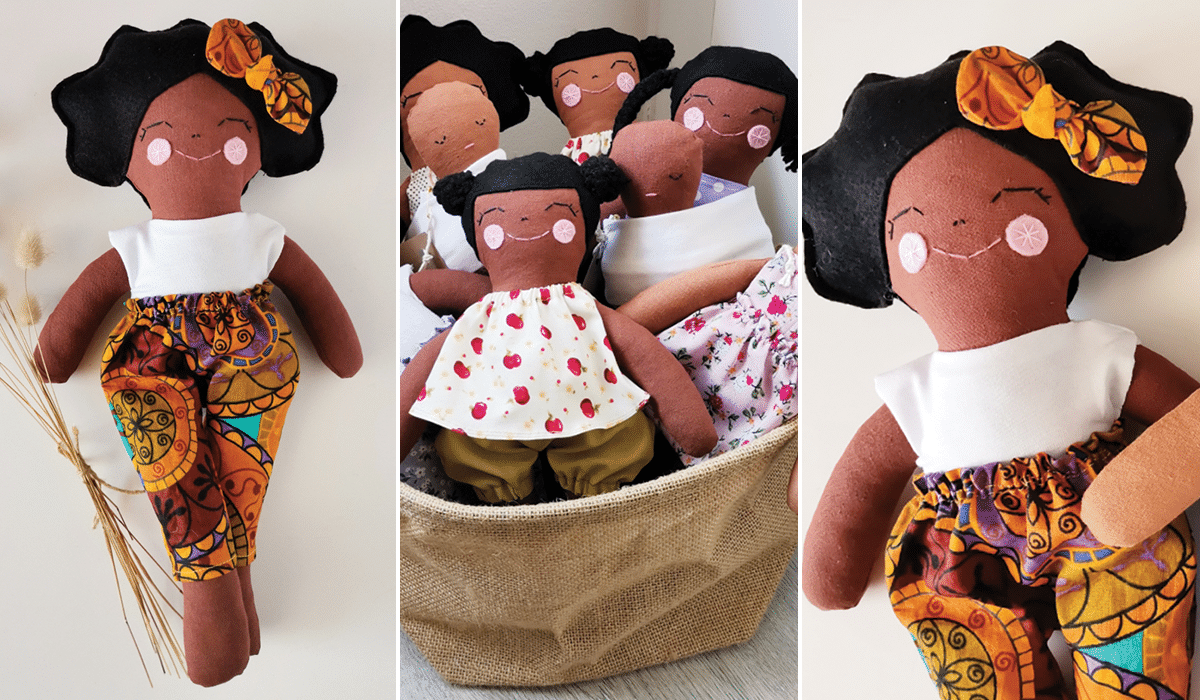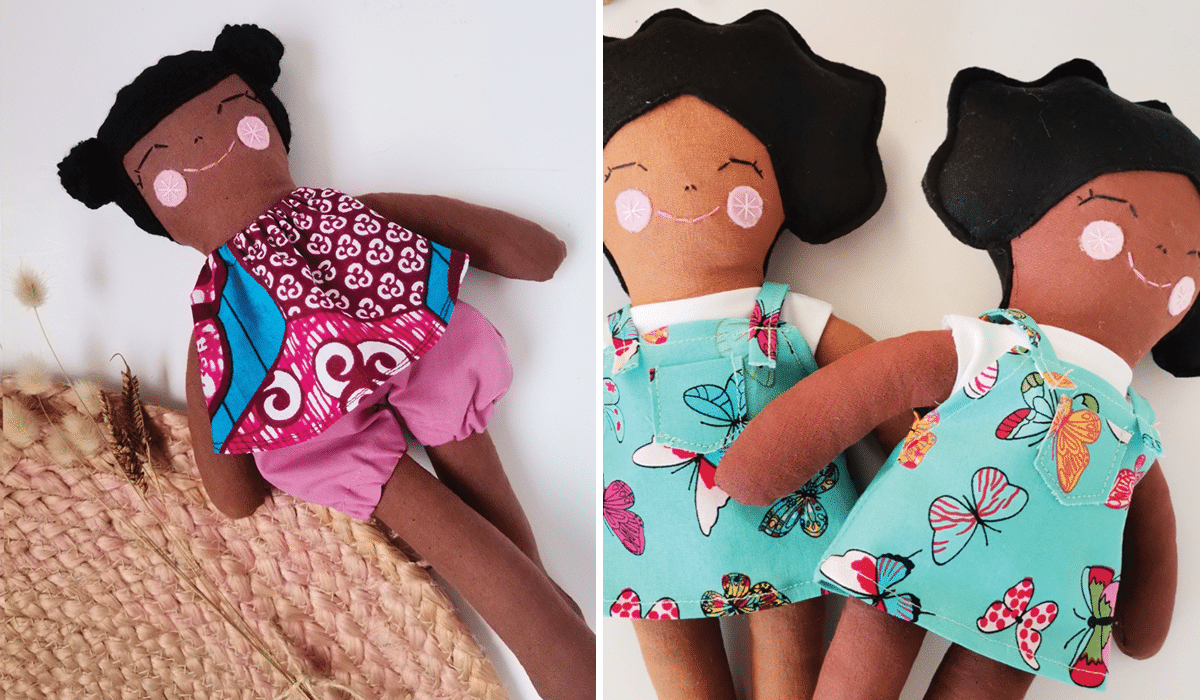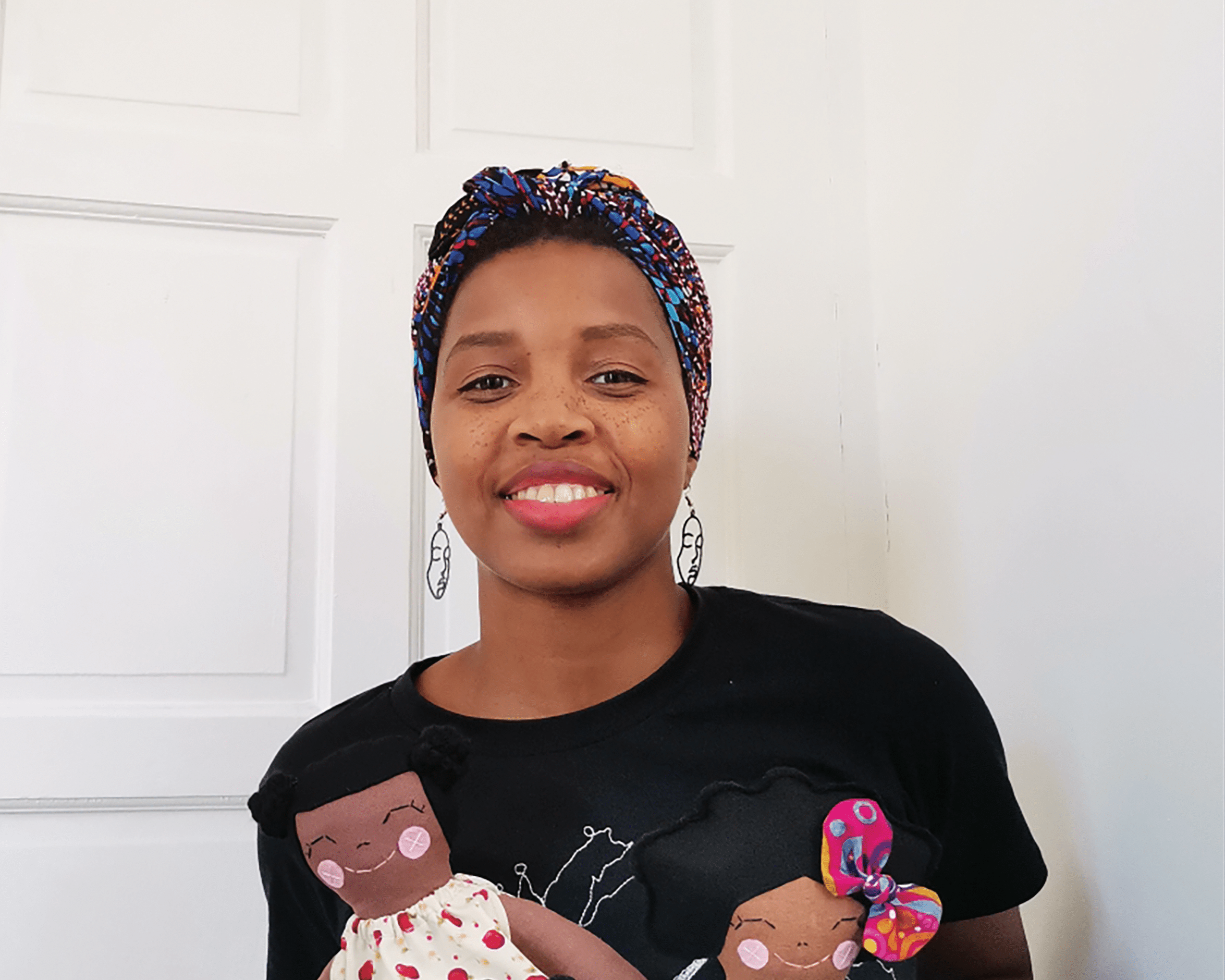At six months pregnant, Nondumiso awoke with a start at the realisation that she was going to be a mother soon. And the mother of a black girl in a world that is hell-bent on telling women who and what to be.
With this gnawing at her mind, she made her way down endless toy aisles looking for something soft, cuddly and beautiful for her daughter to admire and nurture.
How could she plant the seed of self-love in this little person if none of the toys looked like her? Nondumiso chose a plush puppy for her daughter in the end, but her mind kept churning. When she discussed this with friends, they expressed their own frustration at the lack of representation in toy stores.
So, Nondumiso took it upon herself to start making the dolls she was looking for. As a fashion design graduate, Nondumiso put her skills to use and started sketching some patterns for plush brown and black dolls. Two years later, her online store ‘Imibongo kaMakhulu’ – named after her daughter, Imi – was born.
The phrase is isiXhosa for ‘Grandmother’s gratefulness and praise’, and was given to Imi by her paternal grandmother. Decked out in florals and shweshwe, the 13 different dolls have been joined by mermaids, bunnies, an angel, a mother and baby set, plus two beautiful boy dolls, Sibu and Soli, over the years. Nondumiso has kept her studio at home and does everything – from sourcing fabric to packing orders.
Being a ‘mompreneur’ is no easy task, but the joy it brings to her kiddie customers is what motivates her to change South Africa’s toy industry for the better. ‘The funny thing is, I don’t remember playing with dolls – at all,’ laughs Nondumiso. ‘When I started this journey, I went to my mother and asked about my first toys. She said of course I did, like all children do,’ Nondumiso recalls. ‘My younger sister remembers them, but I don’t remember any of them’.

While other children were playing with dolls, Nondumiso was drawing. ‘I enjoyed watching Miss South Africa every year. I loved looking at all the beautiful garments. Even then, I noticed how you could use clothing to shape the body and accentuate features. I fell in love with playing around with fabric and form.
Nondumiso started sketching her own designs, but she had no idea how to sew. In high school, her mother suggested she get a sewing machine. By Grade 10, she was experimenting with basic patterns and even sewed a few cushion covers for her mom. ‘I made some very ugly skirts – they didn’t fit me, and they would split down the side – but in my eyes they were the best because I had made them myself,’ she chuckles.
Just a few years later, she graduated from the Cape Peninsula University of Technology with a degree in fashion design. In 2018, these skills became handy in a different way when she started her range of fabric dolls. She had her very own muse and test subject right there – her daughter absolutely loved her brown-skinned doll.
With the encouragement of her husband and friends, Nondumiso started an Instagram account with a few snaps of what she was working on. Word spread quickly. Five years later, she is as passionate as ever about her business and the role toys play in children’s lives. ‘Children see their toys as their equal and something to care for.
So it’s crucial that toys are representative of all people – we can’t live in a world where there are only two black dolls for every 20 white ones. Diversity in toys reminds us that we’re all one thing – human – although we come in different shapes, sizes and colours. All people should be embraced. And we can teach our children to do this through play,’ she explains.
‘SHE TOOK IT UPON HERSELF TO START MAKING THE DOLLS SHE WAS LOOKING FOR.’
Nondumiso has found that it’s not just black parents who are excited about the dolls. The parents of adopted children and white children have bought these dolls because they want to introduce the concept of diversity to their kids too, she says. Parents may be the buyers, but Nondumiso sees the children as her clients.
‘Seeing their reactions are priceless. We had a pop-up once, and a little girl rushed up to the table and was immediately drawn to the mom and baby doll set. The first thing she did was take the baby doll out of the carrier and hug it. That’s generally the reaction I see. The kids see themselves in the dolls, and they know to nurture them,’ she says.
In keeping with her vision, the dolls can be customised and made to order. A particularly special order was made in 2021. A recently widowed father asked Nondumiso to make a ‘memory doll’ for each of his two young daughters. He wanted them to have something that would remind them of their mother. Working from photographs, Nondumiso created the dolls based on the girls’ favourite dress their mother wore. ‘I thought it was such a beautiful concept and an amazing way to bring comfort to these kids’.

Now that Imi is a bit older, she gets involved in the studio every now and then. ‘Imi stuffs the dolls’ legs – although it’s not always a success. I thank her for the work and then quietly redo it,’ Nondumiso says with a chuckle. Imi also enjoys organising the pin colours and threads – she’s a big fan of rainbows. She often brings in her friends to show them what her mom is up to.
‘She shows them all her favourite dolls and boasts about how cool it all is,’ Nondumiso smiles. Imi goes to creche every day so Nondumiso can work undisturbed for some of the day. Working alone can be lonely, though, so she’s busy creating a community of like-minded makers and creators in Joburg like she had in Cape Town before the family’s recent move. ‘We meet through pop-ups and collaborations, and through this network we can lean on each other,’ she says.
Nondumiso has high hopes for the future of her dolls, and South Africa’s toy industry. She would love to see her dolls in more stores and to one day have her own gifting store. Her vision is for her shop to support creatives, too. She hopes toys will become more representative – in their content and the way they are marketed.
‘We’re headed in a good direction, and that’s largely because makers and creatives are taking it into their own hands and making the toys they want the next generation to have,’ she says. ‘I’m very excited to see what we come up with.’
Each type of doll has its own name, as well as a signature hairstyle and outfit. Keep up with her creations on Instagram @imibongo_kamakhulu or through her online store imibongokamakhulu.com
Words by Christi Nortier
Photography: Supplied







